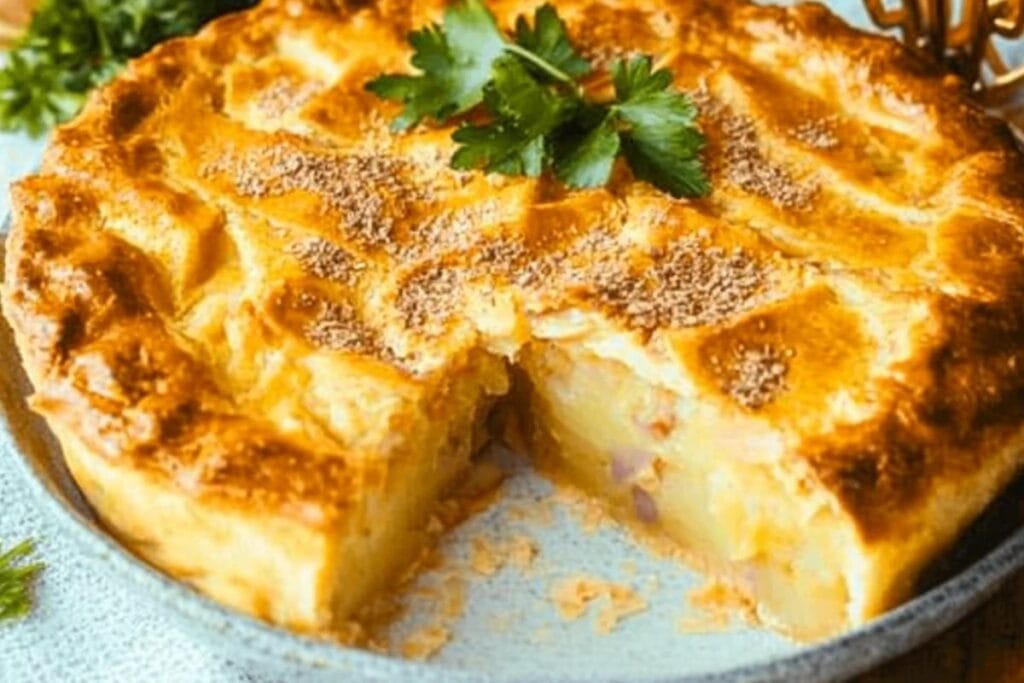For many families, Passover Potato Pie is a symbol of warmth and tradition. It appears on tables each spring, and it brings together loved ones for a special meal. This dish often reminds me of the joy that flourishes during Jewish holiday gatherings. Some people call it a form of potato kugel, while others simply see it as a comforting casserole.
Yet, this pie is more than a basic holiday side. It represents a creative way to honor kosher for Passover rules. It also showcases the versatility of potatoes, which have long been a staple in many cuisines. In this guide, we will explore how to prepare it, share tips for success, and highlight how to serve it for various tastes.
Why You’ll Love This Passover Potato Pie
Key Benefits of Making Passover Potato Pie
Passover Potato Pie is a delicious and versatile dish that makes it easy to embrace holiday traditions while enjoying a comforting, flavorful meal. It’s a great addition to any Passover menu, offering a satisfying balance of soft, creamy texture with a golden crust.
Why This Dish Stands Out:
- Easily customizable – Potatoes absorb flavors well, allowing for different seasoning adjustments.
- Served hot or cold – Enjoy it straight from the oven or chilled as a snack.
- Perfect for holiday pairings – Complements classic Jewish dishes like brisket or roasted chicken.
- Kosher for Passover-friendly – When made with matzo meal, it follows Passover dietary guidelines.
- Simple pantry ingredients – Transforms basic staples into a comforting, memorable dish.
- Traditional yet adaptable – Can be topped with different garnishes or additional flavors.
Potatoes are a Passover favorite since they provide a hearty texture without leavening, making this dish an ideal choice for those looking to enjoy a filling, satisfying meal that aligns with holiday traditions.
Is This Passover Potato Pie Right for You?
This beginner-friendly recipe is perfect for those who want a straightforward dish that still feels festive and flavorful. It offers a texture somewhere between a smooth casserole and a baked kugel, making it a versatile side dish for any occasion.
Who Will Love This Recipe?
✔ Home cooks looking for an easy yet impressive dish – Simple to prepare but rich in flavor.
✔ Passover observers – A reliable, traditional menu option.
✔ Fans of holiday side dishes – A great way to expand your matzo meal recipe collection.
✔ Anyone feeding a crowd – Easy to double the recipe and bake two pies for larger gatherings.
✔ Those who enjoy make-ahead meals – Reheats well and maintains its great taste.
Passover Potato Pie has a way of turning any table into a festive one. Whether you’re keeping things traditional or adding your own touch, this dish is a must-try for your holiday menu.
The Story Behind This Dish
The Origins of Passover Potato Pie
Many link Passover Potato Pie to Eastern European roots, where potatoes replaced grains during the festival. Over time, the dish took shape, blending onion, egg, and often oil for moisture. A related version is known as potato kugel, but the pie shape appeals to those who like neat slices. For an overview of Passover’s historical culinary practices, you can explore references on how holiday customs shaped these recipes.
And yet, the recipe evolved as families migrated. Some families added fresh herbs, while others leaned on simple salt and pepper. Most followed guidelines for unleavened bread alternatives to honor the holiday. That is how this hearty pie became a staple for many Seder meal ideas. The tradition continues, and each year sees fresh spins on the classic.
How It Became a Holiday Favorite
Many households welcomed Passover Potato Pie because it replaced bread-like dishes. It offered a way to have a comforting slice without yeast. Children often enjoyed the mild taste. Grandparents passed down the ritual, marking it as an essential part of the Seder meal. That personal link is one reason it remains a beloved staple.
Yet, it is not limited to the Seder table. Some people make it on other occasions, especially if they prefer a gluten-free choice outside of Passover. Others like to serve it at large gatherings, embracing its ability to feed a crowd. That practicality is part of its appeal. This simple, soul-satisfying dish has woven itself into Jewish holiday dishes across generations.
Ingredients You’ll Need for This Recipe
Full Ingredient List for Passover Potato Pie
This dish is a comforting and traditional recipe, perfect for Passover or any time you want a hearty side dish.
Main Ingredients:
- 6 large potatoes – The base of the dish, providing a creamy texture.
- 4 large eggs – Helps bind the mixture together.
- 1/2 cup olive oil – Adds richness and moisture.
- 1/2 cup matzo meal – Keeps the pie Passover-friendly and provides structure.
- 1 medium onion, finely chopped – Adds depth of flavor.
- 2 cloves garlic, minced (optional) – Enhances the taste with a mild kick.
- Salt and pepper to taste – Essential for seasoning.
- Fresh parsley (optional) – For a fresh garnish.
- Paprika (optional) – Adds a hint of color and mild spice.
These ingredients work together to create a deliciously soft yet firm Passover Potato Pie with a rich flavor profile.
Ingredient Substitutions
If you need to modify the recipe, here are some alternatives:
| Ingredient | Substitute | Notes |
|---|---|---|
| Matzo meal | Ground almonds | Adds a nutty taste for a gluten-free option |
| Olive oil | Vegetable oil | Preserves moisture and flavor |
| Fresh parsley | Chives | Gives a fresh kick without overpowering |
These swaps ensure flexibility while keeping the flavors balanced.
How to Make Passover Potato Pie Step-by-Step
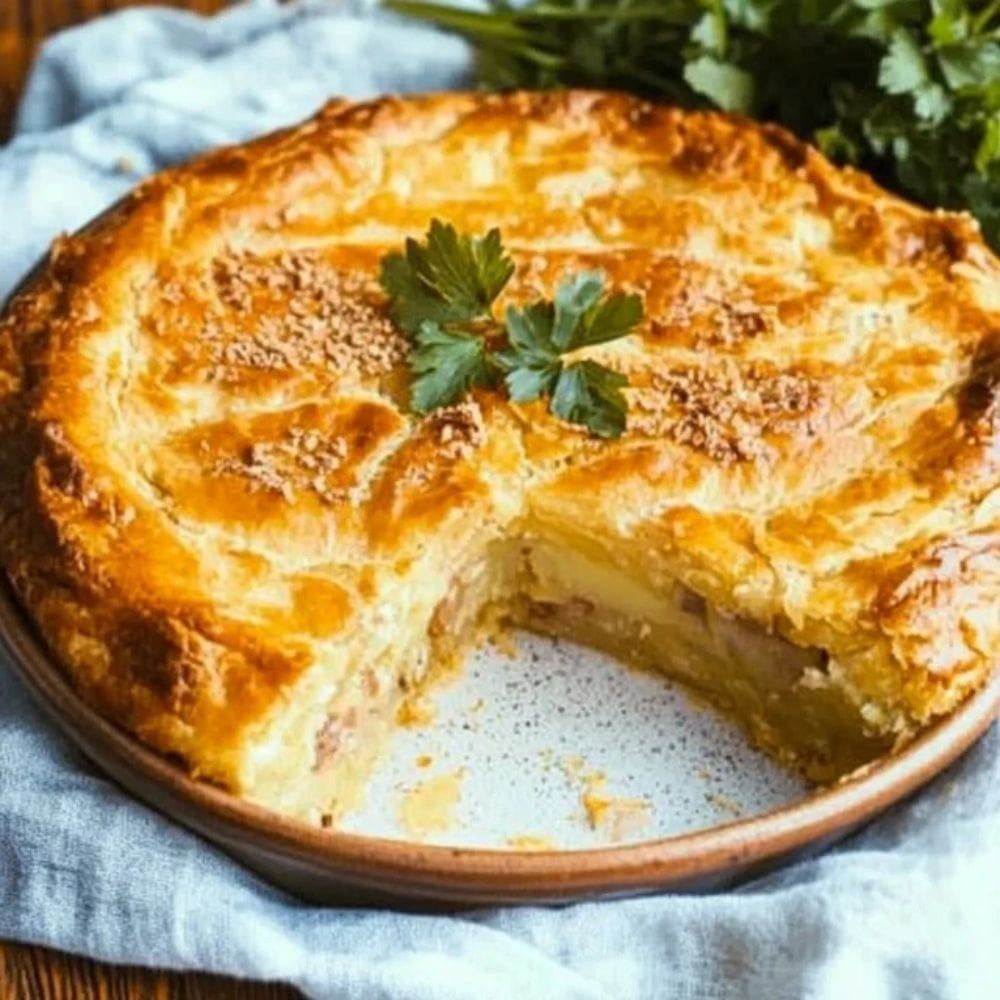
Step 1: Preheat and Prepare
- Preheat the oven to 375°F (190°C).
- Grease a 9-inch pie dish lightly with oil.
Step 2: Cook and Mash the Potatoes
- Peel and chop potatoes into equal-sized chunks.
- Boil potatoes in salted water for 15 to 20 minutes, or until tender.
- Drain thoroughly and mash in a large bowl until smooth.
Step 3: Mix the Ingredients
- Stir in:
- Eggs
- Olive oil
- Matzo meal
- Onion
- Garlic (if using)
- Salt and pepper
Step 4: Assemble and Bake
- Transfer the mixture into the prepared pie dish.
- Smooth the top and dust with paprika if desired.
- Bake for 50 to 60 minutes, or until the top is golden and edges pull away.
Step 5: Cool and Serve
- Let it rest for 10 minutes before serving.
- Garnish with fresh parsley if desired.
Timing Breakdown
| Task | Time Required |
|---|---|
| Prep Time | 20 minutes |
| Cook Time | 60 minutes |
| Total Time | 1 hour 20 minutes |
Enjoy this classic Passover Potato Pie, a delicious and satisfying dish perfect for any occasion!
Expert Tips for Perfect Results
Essential Elements in Passover Potato Pie
Passover recipes often rely on simple, wholesome ingredients, and this pie is no exception. Potatoes serve as the base, offering moisture retention and a satisfying texture. Eggs bind the mixture, ensuring the pie holds its shape when sliced. Onion adds a savory depth, balancing the neutral potato flavor for a well-rounded bite.
Key Ingredients for a Successful Pie:
- High-Starch Potatoes – Russet potatoes create a fluffier texture, keeping it closer to a kugel than a dense casserole.
- Eggs for Structure – Help the pie firm up while maintaining a soft interior.
- Matzo Meal – Absorbs excess moisture, preventing sogginess and improving the pie’s stability.
- Onions for Flavor – Enhances the savory depth, complementing the mild potato base.
- Oil for Richness – Can be adjusted for preference—less oil for a lighter dish, more for added depth.
- Salted Potato Water – Salting the water from the start enhances flavor without needing extra seasoning later.
For additional insights on how potatoes contribute to overall well-being, this guide on the health benefits of potatoes explains their nutritional value and impact.
Tips for Achieving the Right Passover Potato Pie Texture
Getting the perfect texture requires proper preparation and baking techniques. Too much moisture can make the pie runny, while overmixing can create a gummy consistency.
Techniques for the Best Texture:
✔ Drain Potatoes Well – Prevents excess liquid from creating a soggy center.
✔ Avoid Overmixing Eggs – Overbeating can result in a dense or rubbery texture.
✔ For Extra Fluffiness, Fold in Whipped Egg Whites – This technique adds air for a lighter bite, though it’s optional.
✔ Mash Properly – Small lumps are fine, but large chunks can affect even cooking.
✔ Bake Until Golden and Crisp – A well-browned crust adds texture and enhances the contrast between the crispy top and soft interior.
By fine-tuning moisture levels and baking time, Passover Potato Pie can achieve a balanced texture that’s both hearty and delicate. Whether you like it fluffy like a kugel or denser like a casserole, these adjustments can help you perfect your version of this classic dish.
Seasonal Variations to Try
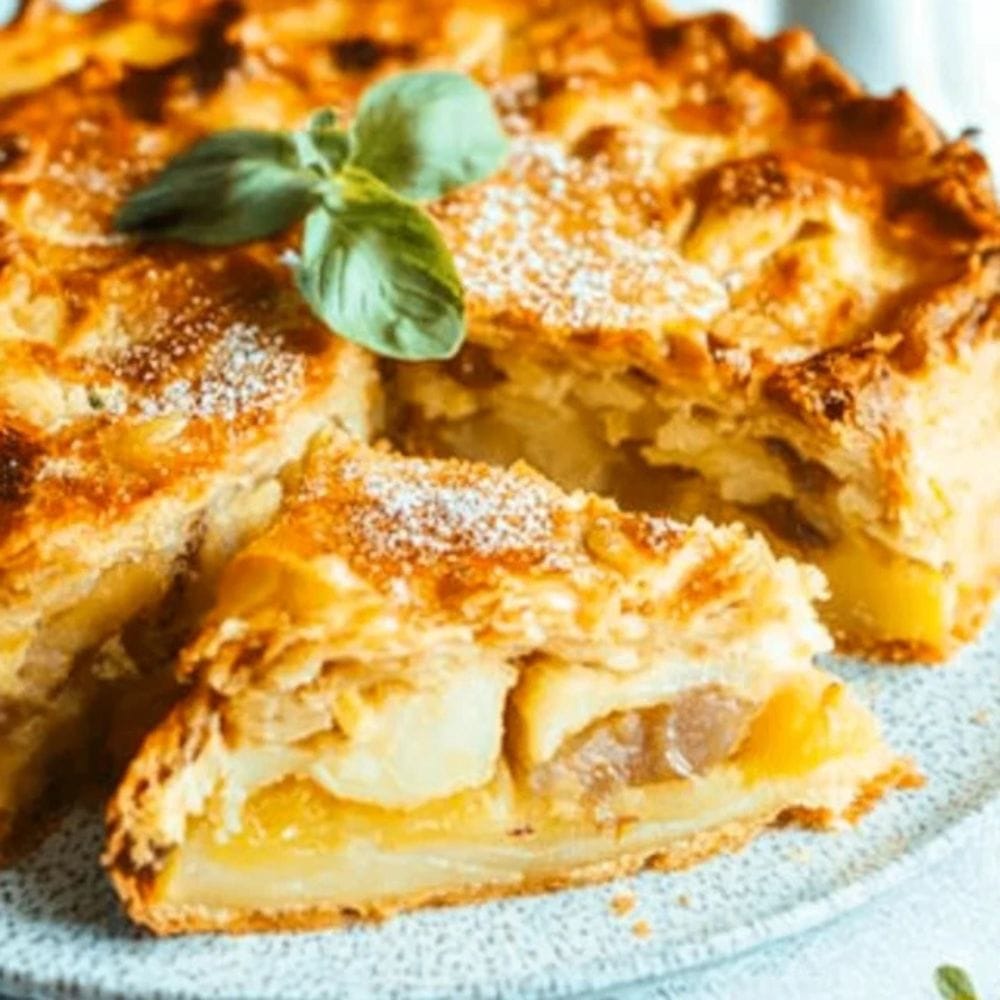
Fresh Approach for Warm Months (Spring & Summer)
Passover Potato Pie can change with the season. In warmer weather, fresh herbs like dill or basil can add brightness. You can also toss in finely diced vegetables for color. Light flavors complement holiday side dishes when springtime arrives. And if you like a milder onion flavor, try green onions or leeks. They pair well with the potatoes and keep the pie from feeling too heavy.
Yet, you might also consider a squeeze of lemon over the top before serving. That twist enlivens each bite. You can serve it alongside a crisp salad, which contrasts with the creamy pie. This approach keeps your table feeling fresh and light. Those who want less starch can mix in a few mashed carrots or even zucchini. The summer heat need not stop you from enjoying comfort food.
Pairing a chilled cucumber salad with your Passover Potato Pie can create a refreshing balance. This tip is especially helpful for daytime gatherings.
Hearty Touch for Cooler Months (Fall & Winter)
In colder seasons, people sometimes boost the richness of Passover Potato Pie. You can sauté mushrooms and fold them in for an earthy flavor. Roasted root vegetables like parsnips or carrots bring a sweet undertone. A sprinkling of nutmeg or cinnamon offers warmth that suits the winter chill. This style can mimic potato casserole dishes that are common in hearty winter meals.
Some folks add shredded brisket on top for a meal-in-one approach. Others serve the pie with thick gravy for extra comfort. There is a coziness to hot, savory fare when the weather turns cold. You might keep a stash of leftover pie for quick lunches, too. The sturdy texture reheats well, so it is perfect for busy weeks.
| Season | Ingredient Ideas | Suggested Serving |
|---|---|---|
| Spring | Fresh dill, diced carrots | Light salad or citrus tea |
| Winter | Roasted parsnips, nutmeg | Warm stew or gravy |
Nutritional Insights into Passover Potato Pie
Notable Benefits of Potatoes
Potatoes are a good source of vitamin C and potassium, which support overall wellness. They also contain vitamin B6, offering more depth to their nutritional profile. Some people appreciate that spuds can help you feel full without relying on bread products. For a deeper look at the health advantages of consuming potatoes, see this health advantages of consuming potatoes.
And they are not high in fat if you limit the oil. That can be helpful if you are watching calorie intake. When used wisely, potatoes can form part of a balanced diet. They also complement many Jewish holiday dishes because they fit kosher for Passover guidelines when prepared correctly. It is smart to enjoy them in moderate portions, accompanied by vegetables and lean protein.
Balancing Flavor with Health in Passover Potato Pie
You can reduce the oil if you want a lighter version of Passover Potato Pie. Using fewer yolks or substituting some sweet potatoes can boost nutrient variety. The matzo meal portion may be trimmed if you prefer a softer texture. Either way, controlling your salt level is a key step, especially if you plan to serve this dish multiple times.
Yet, do not strip out all the oil. A bit of healthy fat carries flavor. Some cooks also explore mixing in mashed cauliflower for variety. That approach can cut carbs without losing the classic comfort factor. Plenty of folks strive for a middle ground that preserves the essence of potato kugel while still leaning on good nutrition.
| Nutrient | Amount (Approx) | Possible Benefit |
|---|---|---|
| Vitamin C | ~20% DV | Supports immune function |
| Potassium | ~15% DV | Aids blood pressure control |
Serving Suggestions
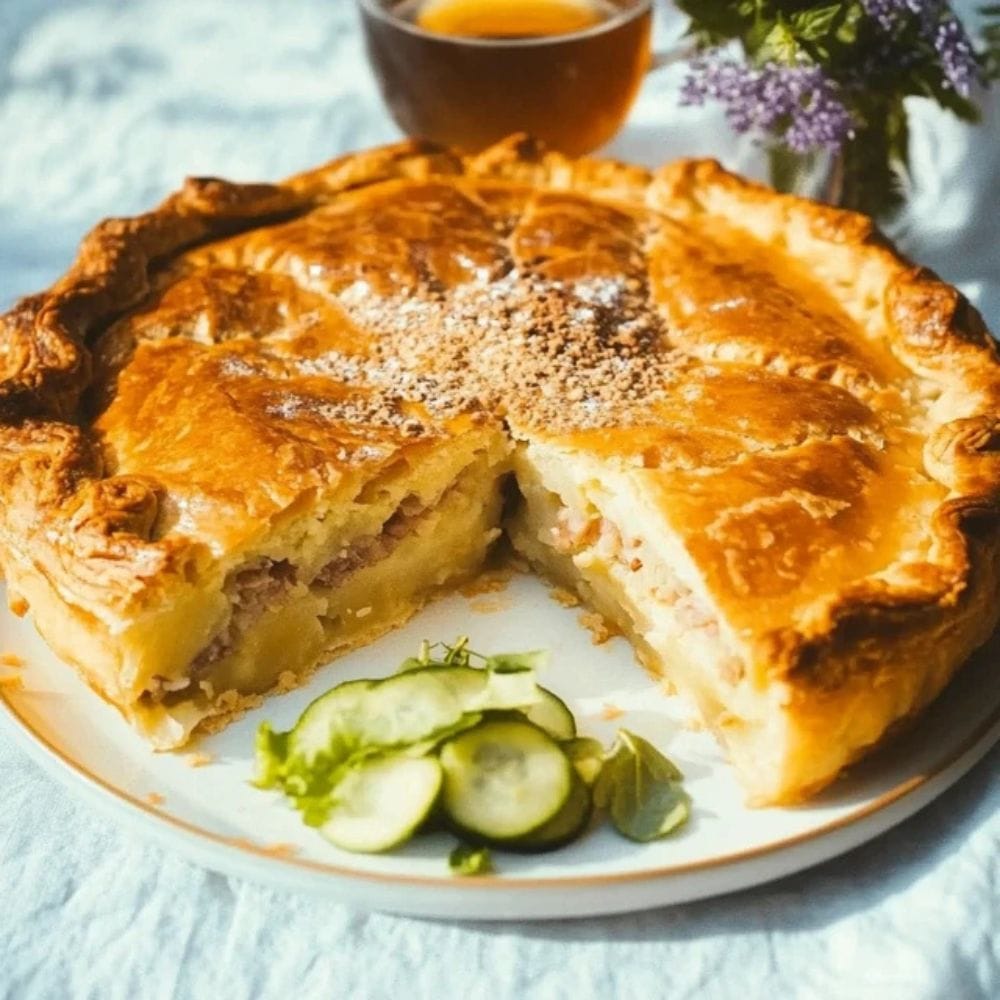
Best Beverages for Passover Potato Pie
Pairing Passover Potato Pie with the right beverage enhances the meal without overpowering its savory, comforting flavors. Drinks that are light and refreshing work best, balancing the richness of the pie.
Ideal Drink Pairings:
- Sparkling water with lemon – Cleanses the palate and keeps the meal feeling fresh.
- Mild herbal teas – Chamomile or mint tea offers a soothing contrast without competing with the flavors.
- Grape juice – A traditional choice that respects Passover customs while adding a hint of sweetness.
- Herbal-infused tea – Pairs well with onion notes if the pie is part of a larger meal.
- Fruit-based punch – Adds a touch of natural sweetness that enhances the flavors of the dish.
- Plain seltzer with lime – Highlights the savory notes of Passover Potato Pie while keeping it light.
While rich, bold drinks may clash with the delicate flavors of the pie, subtle, well-balanced beverages complement it beautifully.
Great Sides to Match Passover Potato Pie
Pairing Passover Potato Pie with the right sides creates a well-rounded meal, offering a mix of textures and flavors that keep the spread exciting yet traditional.
Best Side Dishes:
✔ Crisp cucumber salad with dill – A refreshing contrast to the warm, starchy pie.
✔ Roasted asparagus with lemon – Adds a zesty, vibrant touch.
✔ Grilled chicken or fish – Provides protein, making the meal more substantial.
✔ Matzo ball soup – A classic, comforting addition that fits the Seder theme.
✔ Roasted carrots or beets – Introduces color and natural sweetness to the plate.
✔ Tangy coleslaw – Offers a crunchy contrast that enhances each bite.
For leftovers, portion the pie for easy lunches, pairing it with light salads or roasted vegetables for variety.
Common Mistakes to Avoid
Typical Texture Mishaps in Passover Potato Pie
Getting the perfect texture in Passover Potato Pie requires attention to consistency, seasoning, and baking time. Avoiding these common pitfalls ensures a flavorful, well-structured dish.
What to Watch For:
- Undercooked potatoes – Rushing the boiling process leaves lumps that won’t mash properly.
- Too much moisture – Leads to a soggy pie that won’t hold its shape. Thoroughly drain the potatoes before mixing.
- Skipping matzo meal – This essential ingredient absorbs liquid and binds the mixture, preventing a watery result.
- Lack of seasoning – Salt potatoes at multiple stages to avoid a bland outcome, but don’t overdo it.
- Skipping the resting step – Letting the pie cool slightly before cutting helps it firm up. Cutting too soon causes crumbling.
- Loose batter before baking – If the mixture feels too thin, add a touch more matzo meal for extra binding power.
Taking the time to mash thoroughly, drain well, and season properly makes all the difference in achieving a deliciously balanced pie.
Ensuring an Even Bake for Passover Potato Pie
For a consistently baked Passover Potato Pie, focus on even distribution, oven temperature control, and proper baking techniques.
Baking Tips for the Perfect Texture:
✔ Spread the potato mixture evenly – Prevents uneven cooking and ensures a uniform bake.
✔ Avoid overcrowding the pan – Overfilling slows down baking time, leading to an undercooked center.
✔ Rotate the dish halfway through baking – Helps prevent hot spots and ensures even browning.
✔ Check early for doneness – Oven temperatures vary, so begin checking a few minutes before the recommended time.
✔ Broil for a crisp top – If you prefer a golden crust, finish under the broiler for a few minutes, but watch carefully to avoid burning.
✔ Lower heat if needed – If the top browns too fast while the center remains soft, reduce the oven temperature slightly.
Making a trial batch before a special gathering helps fine-tune baking adjustments based on your oven’s quirks. Small changes ensure a consistently delicious result, making Passover Potato Pie a standout dish on any holiday table.
FAQs About Passover Potato Pie
Can I make this dish ahead of time?What’s the best way to reheat leftovers?Can I freeze Passover Potato Pie?Are there vegan alternatives to this recipe?How do I ensure the pie stays moist?
Final Thoughts
Passover Potato Pie shines as a comforting dish during the Seder and beyond. Its straightforward nature appeals to busy cooks who still want tradition on the table. With a few extra tips, you can fine-tune it to suit your family’s taste. From mild additions like garlic to hearty extras like roasted vegetables, there is plenty of room for creativity.
So, consider trying Passover Potato Pie this holiday. Let the simple ingredients remind you of why gatherings matter. Each slice can carry memories of past feasts and inspire new ones. There is a reason so many folks hold this recipe close. It blends tradition, taste, and convenience, making it a true standout on any festive menu.
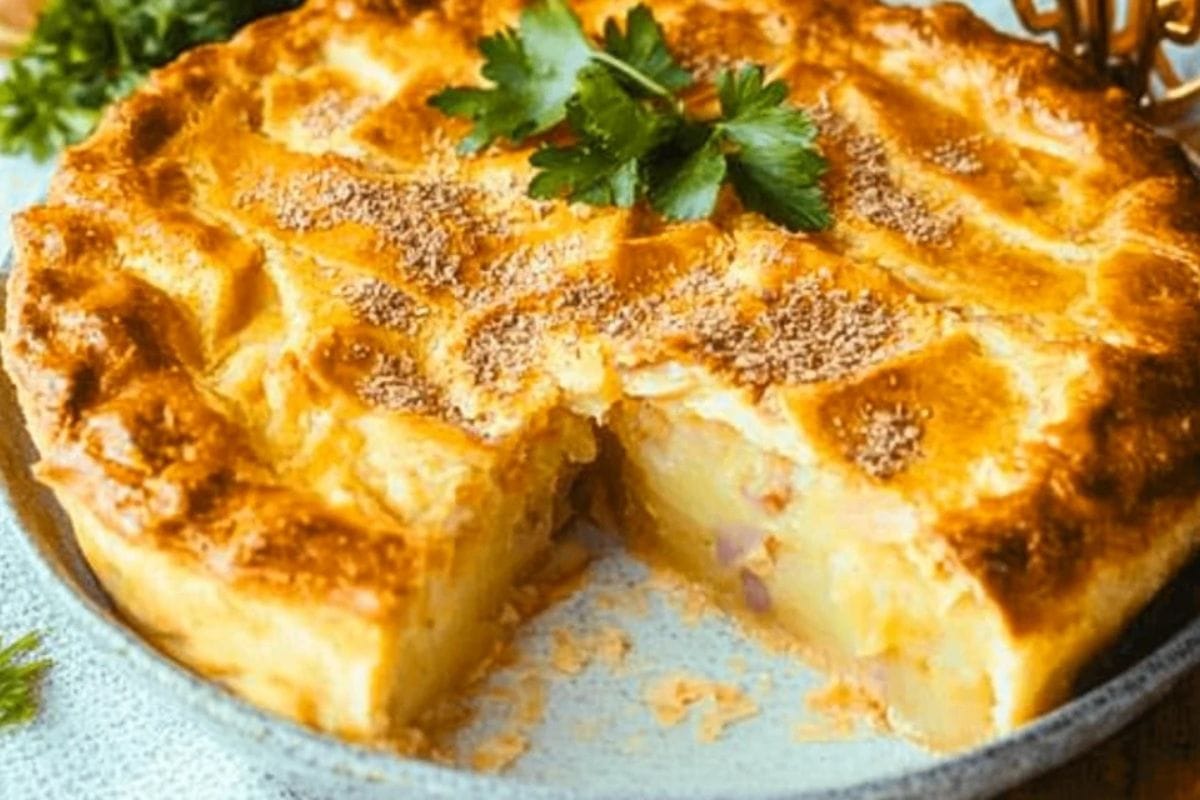
Passover Potato Pie
Equipment
- 9-inch Pie Dish
- Large Pot
- Mixing Bowl
Ingredients
Main Ingredients
- 6 large potatoes Provides a creamy texture
- 4 large eggs Helps bind the mixture together
- 1/2 cup olive oil Adds richness and moisture
- 1/2 cup matzo meal Keeps the pie Passover-friendly and provides structure
- 1 medium onion Finely chopped for depth of flavor
- 2 cloves garlic Minced, optional for extra flavor
- salt and pepper To taste
- fresh parsley Optional, for garnish
- paprika Optional, adds a hint of color and mild spice
Instructions
- Preheat the oven to 375°F (190°C).
- Grease a 9-inch pie dish lightly with oil.
- Peel and chop potatoes into equal-sized chunks.
- Boil potatoes in salted water for 15 to 20 minutes, or until tender.
- Drain thoroughly and mash in a large bowl until smooth.
- Stir in eggs, olive oil, matzo meal, onion, garlic (if using), salt, and pepper.
- Transfer the mixture into the prepared pie dish.
- Smooth the top and dust with paprika if desired.
- Bake for 50 to 60 minutes, or until the top is golden and edges pull away.
- Let it rest for 10 minutes before serving.
- Garnish with fresh parsley if desired.

